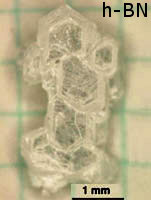
Photo from wikipedia
The prominence of two-dimensional hexagonal boron nitride (2D h-BN) nanomaterials in the energy industry has recently grown rapidly due to their broad applications in newly developed energy systems. This was… Click to show full abstract
The prominence of two-dimensional hexagonal boron nitride (2D h-BN) nanomaterials in the energy industry has recently grown rapidly due to their broad applications in newly developed energy systems. This was necessitated as a response to the demand for mechanically and chemically stable platforms with superior thermal conductivity for incorporation in next-generation energy devices. Conventionally, the electrical insulation and surface inertness of 2D h-BN limited their large integration in the energy industry. However, progress on surface modification, doping, tailoring the edge chemistry, and hybridization with other nanomaterials paved the way to go beyond those conventional characteristics. The current application range, from various energy conversion methods (e.g., thermoelectrics) to energy storage (e.g., batteries), demonstrates the versatility of 2D h-BN nanomaterials for the future energy industry. In this review, the most recent research breakthroughs on 2D h-BN nanomaterials used in energy-based applications are discussed, and future opportunities and challenges are assessed.
Journal Title: Energies
Year Published: 2022
Link to full text (if available)
Share on Social Media: Sign Up to like & get
recommendations!